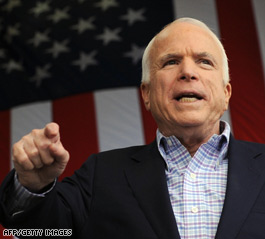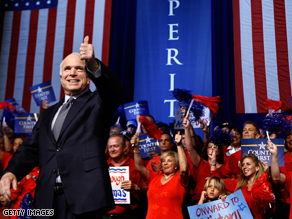Is McCain Coming Back?

Does recent polling suggest a McCain comeback at the right time or something else? Photo by Ricky Carioti -- The Washington Post
Amid the wall-to-wall coverage of Barack Obama's $150 million fundraising take in September and the endorsement of the Illinois senator on Sunday by former Secretary of State Colin Powell, the campaign of his Republican opponent -- John McCain -- believes the media is missing one critical thing: the Arizona senator is making up ground.
McCain advisers insist that since last Wednesday's final debate in New York, their candidate has slowly but surely cut into Obama's edge -- carving a double-digit lead down to the mid-single digits in both national polling and surveys conducted in key battleground states.
While the final debate was widely cast by the media -- and by a series of instant reaction polls -- as a win for Obama, McCain's senior strategy team argues that it was, in fact, a critical turning point in their favor in the contest.
"That debate injected taxes, ideological difference and abortion" into the dialogue, said a McCain operative granted anonymity to speak candidly about strategic matters.
The result, according to the source, was significant gains for McCain among white men -- those with and without a college degree -- as well as with "soft" Republicans (a term to describe voters with only a loose party affiliation) and voters who consider life issues as central to their vote for president.
The bump-up in support from white men -- an absolutely critical demographic for McCain if he hopes to come from behind -- also explains the relentless focus on "Joe the Plumber" a.k.a. Joe Wurzelbacher, a man made famous by his confrontation with Obama last week.
Don't trust the McCain internal poll numbers? Look to a series of tracking surveys over the last week, the campaign argues.
Among the surveys they cite:
• An Oct. 19 Gallup tracking poll that shows Obama leading McCain 49 percent to 46 percent according to a "traditional likely voter model" it has employed for past elections which, Gallup's Web site explains, "factors in prior voting behavior as well as current voting intention." It's worth noting that among registered voters in the Gallup survey, Obama held a 10-point edge, and in the other (broader) likely voter model presented by Gallup the Illinois senator led 51 percent to 44 percent.
• A Reuters/C-SPAN/Zogby tracking poll that on Oct. 11 showed Obama ahead 49 percent to 43 percent and, one week later, had Obama's lead at narrower 48 percent to 45 percent. Zogby, a favorite of Matt Drudge, is looked at somewhat more skeptically by some within the polling establishment.
• A poll jointly conducted by Celinda Lake, a Democratic pollster, and Ed Goeas, a Republican pollster, for George Washington University that had Obama at 49 percent and McCain at 45 percent. That survey was in the field Oct. 12 to Oct. 16, however, meaning that only one day of polling for it was conducted after the Oct. 15 debate at Hofstra University.
• A CNN/Opinion Research survey out today has Obama at 51 percent and McCain at 46 percent.
Convinced? Is it possible that the McCain comeback is happening right under our noses and is not being picked up due to the media's focus on the possibility of an Obama presidency?
Maybe, but a detailed look at the polling and the national playing field suggests that McCain's growth -- to the extent he has enjoyed it -- over the past week is as likely due to a natural tightening as election day approaches as any sort of major surge in support.
From Sept. 7 -- the day that Fannie Mae and Freddie Mac were bailed out by the U.S. government -- through the first week in October, the news was unequivocally bad for McCain and his party.
Voters overwhelmingly blamed the GOP -- particularly President George W. Bush -- for the economic morass. McCain's numbers tanked nationally and in key battleground states (Pennsylvania, Michigan, Wisconsin, Florida among others) as did the numbers for Republicans seeking Senate and House seats.
In that free-fall it's possible (and, perhaps, likely) that McCain's poll standing dropped below what any generic Republican presidential candidate could expect to receive in the way of support. During that period, voters who were almost certainly in McCain's camp before the financial crisis jumped ship -- heading either to the undecided camp or to Obama's side.
The last few days -- particularly given McCain's return to a very traditional "big government, tax raising liberal" attack against Obama -- may well have brought some of those voters who left McCain in a huff back into the fold as the debate reminded them of why they vote for Republicans in the first place.
But, simply re-claiming voters long expected to be on your side (and we are thinking of life voters in particular here) is not the same thing as turning a corner with critical independent voters -- either nationally or in battleground states.
While the polling outlook may well have improved marginally for McCain over the past week, the structural problems revealed in the most recent Washington Post/ABC News poll remain.
The election is a referendum on the economy and which candidate is better suited to correct its problems. Due to the strong sense that the country is headed off in the wrong direction AND the huge unpopularity of Bush, Obama is far better positioned to win the economic argument than McCain.
And, never forget the continued financial advantage that Obama enjoys over McCain. It's extremely difficult for a candidate trailing in the polls to overcome being outspent three to one and, in some cases, far worse without some sort of major external event intruding.
In sum, can we buy that "Joe the Plumber" and Obama's pledge to "spread the wealth" has helped bring white men back to McCain's side? Absolutely. Is it enough to change our current analysis that Obama is the clear frontrunner to be the next president of the United States? No.

 Why Do I Have to Log In Again?
Why Do I Have to Log In Again?












View All Comments »